Radio-A-Thon for Syria
August 11, 2012
This is going on NOW. Please join and support your suffering brothers and sisters in Syria.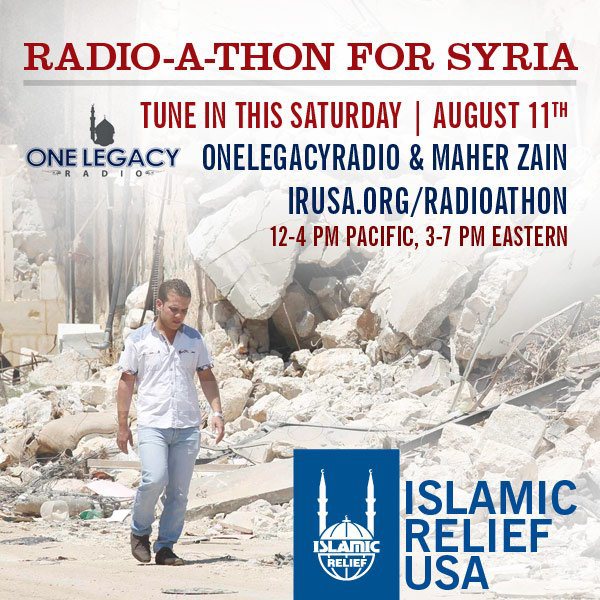 www.irusa.org/radioathon
www.irusa.org/radioathon
August 11, 2012
This is going on NOW. Please join and support your suffering brothers and sisters in Syria. www.irusa.org/radioathon
www.irusa.org/radioathon
August 10, 2012
It is narrated by Sayyiduna Abdullah bin Umar that the Holy Prophet (sallallahu alayhi wa sallam) said:
“When the belly of Makkah will be cleft open and through it will be dug out river-like passages (i.e. tunnels) and the buildings of the Holy City of Makkah will rise higher than its mountains, when you observe these signs, then understand that the time of trial is near at hand.”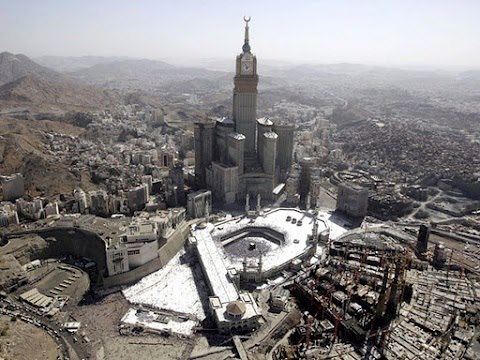
The ahadith (narrations of the Prophet, sallallahu alayhi wa sallam) are pearls of guidance and advice that are timeless in their wisdom. There are some ahadith, however, that cause the hairs on the back of your neck to stand up as you slowly peel away the onion-like layers of meaning in them. One such hadith is that quoted above; one of the many prophecies of our Prophet (sallallahu alayhi was sallam).
If one compares this hadith to a “prophecy” emanating from someone like, for example, the medieval “seer” Nostradamus, whose books of prophecies are so beloved that they have only rarely been out of print since their original publication in the 1500s, there is a stark difference. The quatrains of Nostradamus are so woolly, vague and nonspecific they can be twisted to suit any and every time – so the same prophecy has been seized upon as an example of him “predicting” everything from the French Revolution, to both world wars, to the moon landing and even the death of Princess Diana.
The above hadith prophesying the state of Makkah towards the end of time reads more like an eyewitness account from an alien-like future. No concerted attempt has ever been made in Islamic history to claim that this hadith speaks for that time… until now when, much like a camera suddenly coming into focus, we can suddenly see what our beloved Prophet (sallallahu alayhi wa sallam) was warning us about. When taken together with several other ahadith, including the famous Hadith of Jibril which speaks of the coming of the Day of Judgment being when “you see poor, naked, barefoot shepherds of sheep and goats competing in constructing tall buildings”, one sees a distinct pattern. This is especially so when combined with the current list of vainglorious monuments to the hubris of the ruling classes over much of the Arab world:
When reading this one wonders whether those in power in those countries (or their advisors) have ever heard these ahadithand, if so, why have they gone ahead to build these follies, in most cases dedicated to their own pride?
This, however, begs the following wider question. If they are so willing to ignore the ahadith of our beloved Prophet (sallallahu alayhi wa sallam), what does that make those of us who, labouring under the collective “British Muslim” moniker, have abandoned so many ahadith. The hadith above describes the characteristics of those who build these towers; nowhere does it curse them. That is starkly contrasted to the many sound hadith regarding, for example, music:
Ali Bin Abi Taalib (radhiyallahu anhu) narrates that Rasulullah (sallallahu alayhi wasallam) said: “When my Ummah indulges in fifteen misdeeds, calamities will settle on them. Among these are singing girls and musical instruments.” (Tirmidhi)
Abu Hurairah (radhiyallahu anhu) narrates that Rasulullah (sallallahu alayhi wasallam) said: “Listening to music and singing is sinful. Sitting at such gatherings is fisq (immoral transgression). Deriving pleasure from it is kufr.” (Nailul Autaar)
Ibn Mas’ud (radhiyallahu anhu) narrated that Rasulullah (sallallahu alayhi wasallam) said: “Beware of listening to musical instruments and singing, for verily, both these acts germinate nifaaq (hypocrisy) in the heart just as water causes vegetables to grow.” (Kaf-fur Ru’aa’)
Abu Musa Ash’ari (radhiyallahu anhu) narrated that Rasulullah (sallallahu alayhi wasallam) said: “Whoever listens to the sound of singing, he will not be given permission to listen to the (beautiful) voices of the Ruhaaniyyeen in Jannat.” When it was asked: “Who are the Ruhaaniyyeen?” Rasulullah (sallallahu alayhi wasallam) said: “The Qaaris of Jannah.” (Kanzul Ummaal)
Abu Maalik Ash’ari (radhiyallahu anhu) says that he heard Rasulullah (sallallahu alayhi wasallam) say: “Most certainly, there will be in my Ummah people who will make lawful fornication, silk, liquor and musical instruments.” (Bukhaari)
Or indeed those ahadith regarding the hijab:
Ayesha (radhiyallahu anha) reported that Asma’ the daughter of Abu Bakr (radhiyallahu anhu) came to the Messenger of Allah while wearing thin clothing. He approached her and said: “O Asma’! When a girl reaches the menstrual age, it is not proper that anything should remain exposed except this and this. He pointed to the face and hands.” (Abu Dawud)
“All of a woman’s body is considered her awrah (i.e. nakedness to those outside the mahram relationship or her husband).” (al-Mar’atu `Awra)
“Women who are clothed but (at the same time) naked, turning their heads sideways this way and that like the humps of the camel, shall never enter Paradise nor even smell its fragrance.” (Muslim)
It is easy to condemn an Arab ruler who makes himself look ridiculous in his humiliating aping of western culture. We are all very vocal, laughing at their folly and their ignorance of well-known ahadith. Where, however, is the same condemnation when our own “leading lights” cast around for any sort of odd and tenuous opinion that would allow them to wiggle out of rulings on issues that the majority of scholars have deemed haram?
Indeed, whenever a hadith strongly suggests the impermissibility of something (e.g. the impermissibility for a woman to uncover her hair in public), the average reformist of Islam will cock his head at a certain angle and speak in a low, calm voice as if addressing a particularly dim-witted child as he explains that either (i) the hadith is da’eef (weak), or (ii) there are “many” ahadith supporting the opposite view, or (iii) the scholar (and I have seen them include great shuyukh of Islam up to and including Imams Malik, Shafi, Ibn Hanbal and Abu Hanifa) who came to that particular conclusion was not in receipt of all the facts and so his ruling is deficient.
We recognise the power of ahadith when we come across those like the one set out at the the top of the page. These words are from the tongue of the Prophet himself, sallallahu alayhi wasallam, and they have crossed the oceans of time awaiting their moment in order that they can describe a people so distant from ninth century Makkah and yet so desperately in need of the guidance of their beloved Rasool, sallallahu alayhi wasallam.
As we recover from the momentous idea that our beloved Prophet (sallallahu alayhi wasallam) loved us so much that he scattered his advice like pearls, throughout the ages to help us along our way, we then reflect on the reason we have this hadith – it is both a description and a warning to us:
“…when you observe these signs, then understand that the time of trial is near at hand.”
We may well be the generation that face the trials that so many of the ahadith speak of. We have the strongest armour as our protection: the Quran and the Sunnah, but they can only help us if we don them in their entirety.
يَا أَيُّهَا الَّذِينَ آمَنُوا ادْخُلُوا فِي السِّلْمِ كَافَّةً وَلَا تَتَّبِعُوا خُطُوَاتِ الشَّيْطَانِ إِنَّهُ لَكُمْ عَدُوٌّ مُّبِينٌ. البقرة: ٢٠٨
“O you who have believed, enter into Islam whole heartedly and do not follow the footsteps of Satan. Indeed, he is to you a clear enemy.” (Quran, 2:208).
May Allah make our imaan strong enough to bear these trials and guide us to His straight way. Ameen.
August 9, 2012
With i’tikaf rapidly approaching, I thought it may be beneficial to share
some advice on how to benefit from these last ten days. I am not one to
impart advice, as I am the most in need of advice, but I thought I would
share a transcript of some of Shaykh Husain’s (db) words.
*
*
*Advice from Shaykh Husain Abdul Sattar (db)*
Gatherings as you were used to may not always exist. If you travel around
the country you’re not going to find many gatherings of this nature. These
are the things that have been planted in your backyard, and you have to
take advantage of it because just as people move things will move.
Opportunities are limited, and this is the time that you need to use
wisely. Don’t waste your time. Pick a corner in the masjid. Forget about
who else is here, and forget about what people are doing and what they’re
not doing. Absolutely focus on Allah (subhanahu wa ta‘ala). Make some kind
of permanent change. Make some kind of lasting change. Create some depth in
your exercises.
If you’re a hafiz or you’re trying to be a hafiz, sit down with the Qur’an
and just dig into it. You have your whole life to be able to stand up and
walk here and walk there and wonder what he’s doing and what she’s doing.
Dig into it, especially in these ten days. For the hafiz, he should be
revising the entire 30 ajza’ in these ten days. And for the one who’s
becoming a hafiz, he should complete everything that he has done up until
now in these ten days.
For any other endeavor for which you aim to achieve something, begin in
these ten days. If you want to develop some sort of deeper connection to
the sunnah, now is the time to start. Embed it into your schedule now. If
we can’t create the perfect schedule locked up in i’tikaf, cut off from the
world, when are we going to create the perfect schedule? We aren’t going to
do it when we leave here. If we can’t establish the awwabin prayer now, if
we can’t establish the tahajjud prayer now, if we can’t establish prayer
salah al-tasbih once in a while now, when are we going to do it? This is
the time we’re supposed to do it. Ramadan has made us soft. It’s removed
much of the mountain of sin that we brought with us, and in these ten days
we have the opportunity to establish a schedule. So take advantage of these
opportunities.
This is a clinic. A drug addiction clinic, because everyone brings their
addictions here. So whatever sin you may have been addicted to, make a firm
resolve to cut yourself off. And whatever acts of ‘ibadah you hope to
achieve outside of these ten days, begin to inculcate them into your
schedule in these ten days. Spend time in muraqabah. Spend time in the
adhkar. Learn the things that you’re supposed ot be reciting after wudu’,
after salah, how you’re supposed to make dua. Start embedding these into
your schedule.
For example, everyone should leave this gathering knowing the dua that you
make after wudu’. Everyone should leave this gathering knowing the dua of
Laylah al-Qadr, because you’re going to use it every single night. Everyone
should leave this gathering knowing the dua of entering and exiting the
masjid. These are things that we do regularly here. If we begin to practice
these things now, inshaAllah, they’ll become our partner outside of this
gathering.
So it’s in your court. This is not magic. It’s not that you just take a
wand and tap it on everyone’s head and everybody becomes perfect. You have
to make some niyyah. You have to make some effort. And then see where Allah
takes you. In these days, one step brings you very close to Allah. One tiny
step can take you very far in your spiritual journey. So dig deep. Dig
deep, inshaAllah.
Please make dua for me during these last ten days, and send this to anyone
whom you think may be able to benefit.
August 8, 2012
http://www.youtube.com/watch?v=GFFJDsyltu0
The Islamic Society of Joplin was burned to its foundation on August 6, 2012. Show them your support and help them to rebuild by making donations to them. Make checks payable to the Islamic society of Joplin and send to:
Commerce Bank
211 Main Street
Joplin, MO 64801
Help rebuild our mosque
The Joplin mosque is the centerpiece of a thriving and well-rooted community in Joplin, Missouri. It is the only mosque within a 50-mile radius, and serves both the local Muslim community as well as the community at large. During last year’s tornados, the Joplin mosque served as a headquarters for Muslim relief workers who flew in from around the country to see what they could do to help Joplin residents get back on their feet.
Unfortunately, in the middle of Ramadan a suspicious fire burned our mosque to the ground, and our community is left without a home during the most precious time of the year. While heartbroken, we are buoyed by the support of people around this country, of all faiths, who have come to our side in our time of need.
The rebuilding begins now
We are hoping to tap into the blessings of the last 10 days of Ramadan to raise funds so that we can replace our house of worship as soon as possible, and build the foundation for a revitalized community that is determined to build a better life for ourselves and our neighbors.
What you can do
You can help us realize our dream of replacing our mosque and moving forward with our lives by doing the following for us:
Donate what you can – every little bit helps. We welcome your charitable contributions for this year and pledge to put them to good use in rebuilding.
Share our IndieGoGo fundraising link with your social networks
Give us your prayers in these last precious days of Ramadan
An investment in the future
The best response to those who wish us ill is to draw from the best of our faith, and show the world that the power of good will forever outweigh those who wish to harm others. Thank you for joining us in this effort!

July 25, 2012
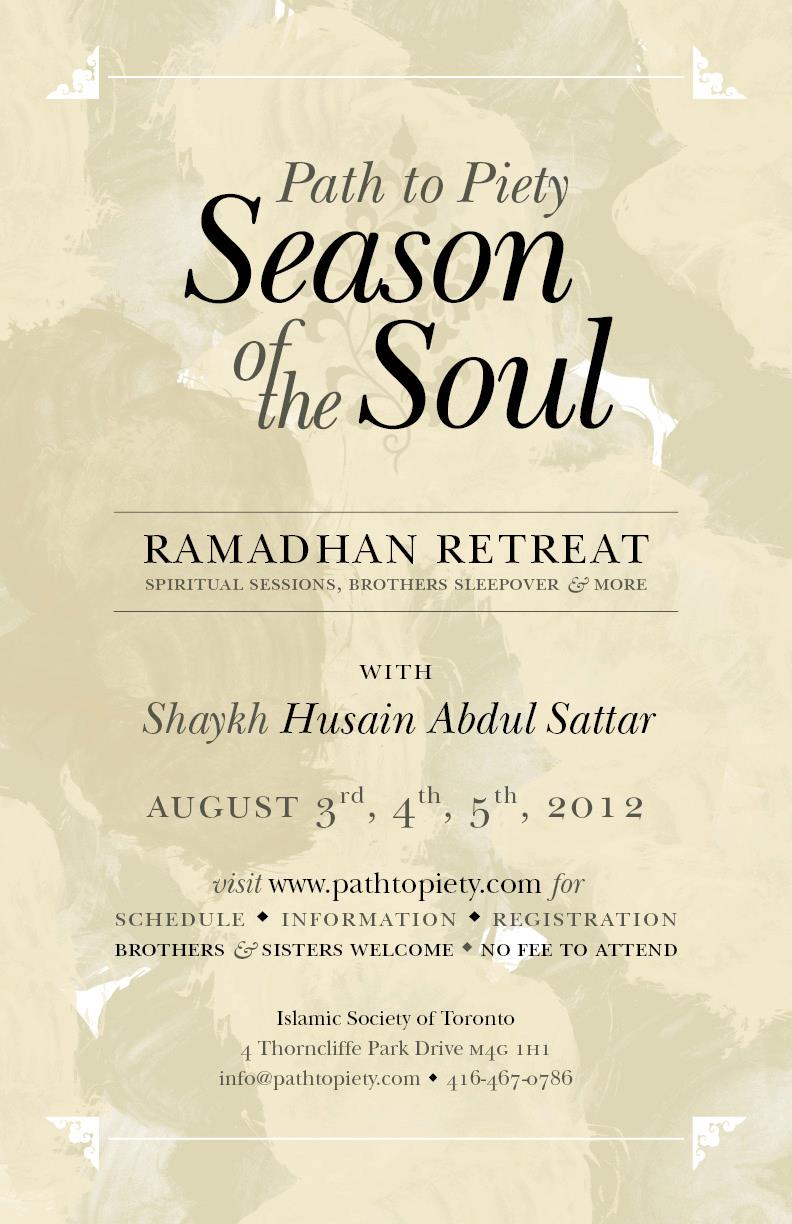 August 3,4&5, 2012, Path to Piety will be hosting Shaykh Husain Abdul Sattar for a 3 day retreat at the Islamic Society of Toronto – Masjid Dar Us Salaam. Visit our website at www.pathtopiety.com for more information
August 3,4&5, 2012, Path to Piety will be hosting Shaykh Husain Abdul Sattar for a 3 day retreat at the Islamic Society of Toronto – Masjid Dar Us Salaam. Visit our website at www.pathtopiety.com for more information
July 24, 2012
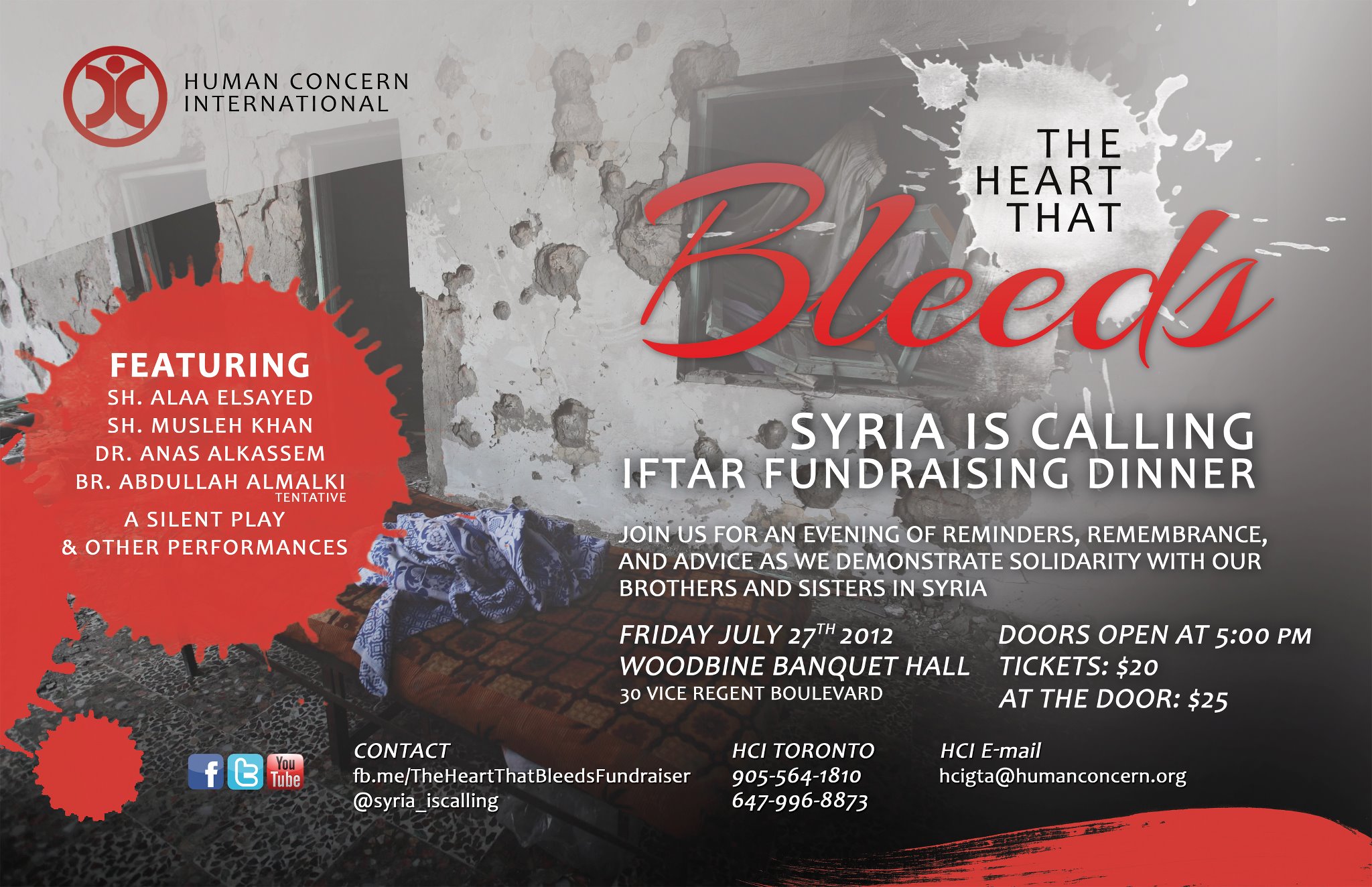
Friday, 27 July 2012 from 5:00 PM to 10:00 PM
Toronto, Ontario
The Heart That Bleeds | Fundraising Iftaar Dinner for Syria
http://theheartthatbleeds.eventbrite.ca/
As we are all aware of the genocide that is currently taking place in Syria where thousands of children, women, and men have been raped, tortured and slaughtered, a group of youth from Toronto decided that they needed to do something to mobilize the community into action for helping those most afflicted by the violence in Syria. The money raised will help in providing humanitarian aid including food, medical aid, and emergency shelter for those most afflicted by the violence.
Join us for a SPECIAL night with incredible speakers and entertainment for the entire family
Tickets are only $20.00 / At the door $25.00
Table tickets (6 seats) $100.00
Dinner is included!
Join us on Facebook! https://www.facebook.com/events/458508824167589/
Follow us on twitter https://twitter.com/SYRIA_isCALLING
Questions? Syria.is.calling@gmail.com
Want to volunteer? Join our group:
https://www.facebook.com/groups/248705015247579/
Join us for an evening of reminders, remembrance, and advices as we demonstrate solidarity with our brothers and sisters in Syria!
Sponsored by Human Concern International
July 19, 2012
July 16, 2012
The Supreme Court has called on all Muslims in the Kingdom of Saudi Arabia to sight the crescent of the blessed month of Ramadan on Thursday evening, Shaaban 29, 1433AH, corresponding to July 19, 2012, according to Umm Al-Qura Calendar.
In an announcement made this morning, the Supreme Court also called on whoever sees the crescent of the blessed month of Ramadan by naked eyes or through binoculars to report to the nearest court and register his testimony, or report to the authority of the region’s governorate if there is no judge in the area where he sighted the crescent in order to facilitate his reaching to the nearest court.
The Supreme Court also urges all Muslims to sight the Crescent for the cooperation of all Muslims in righteousness and piety.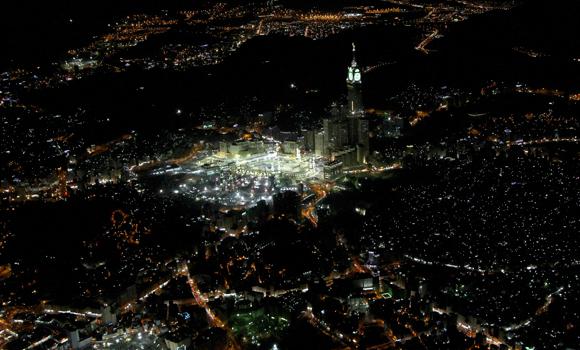
July 12, 2012
 Since 2009, Project Ramadan has provided baskets of food to over 1,000 families across the Greater Toronto Area. Each basket contains all the basic ingredients needed to feed a family for a month. We’re aiming to make 2012 the biggest year yet, but we can’t do it without your help. For only $50 you can buy a basket that we will put together using our enthusiastic volunteers, and the Muslim Welfare Centre will help us deliver it into the hands of a Toronto family that could use a little help.
Since 2009, Project Ramadan has provided baskets of food to over 1,000 families across the Greater Toronto Area. Each basket contains all the basic ingredients needed to feed a family for a month. We’re aiming to make 2012 the biggest year yet, but we can’t do it without your help. For only $50 you can buy a basket that we will put together using our enthusiastic volunteers, and the Muslim Welfare Centre will help us deliver it into the hands of a Toronto family that could use a little help.
TO DONATE AND BUY BASKETS
Visit http://www.moveyourcommunity.com and click on DONATE NOW and select ‘Iftaar Dinner Baskets’ from the drop down menu
TO SPONSOR THE PROJECT
If you own your own small business or wholesaler, and would like to be a part of the Project Ramadan team, call us at 1-877-655-5523
TO VOLUNTEER WITH PROJECT RAMADAN
Interested in putting your time and energy into a good cause?
Email us at volunteer@moveyourcommunity.com 🙂
QUESTIONS?
Join the Facebook Group: Project Ramadan: Iftaar Baskets for the less fortunate in the GTA.
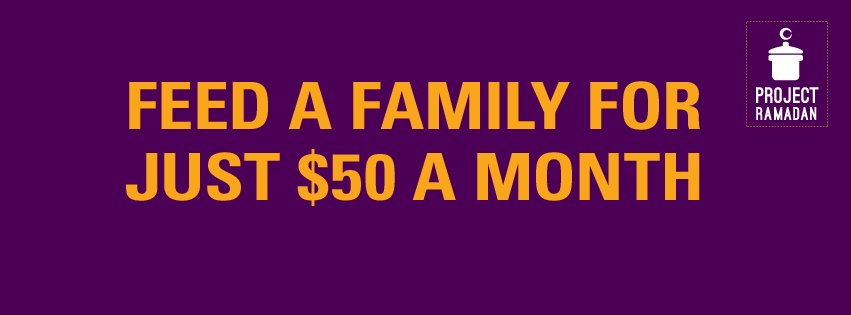
July 4, 2012
Tonight is a very big night. Night of Laylatul Baraa’The 15th night of Sha’baan. We humbly request all to first please forgive please keep us in your du’as tonight. JazakAllah
Virtues of this night
It is narrated from Hadhrat Mu’az bin Jabal (RA) that Rasulullah (Sallalahu Alaihi wa Sallam) said: “On the fifteenth night of Sha’baan, Allah Ta’ala bestows His special attention on His entire creation. He then forgives His entire creation except a polytheist and one who has hatred for others.” (Ibnu Hibbaan #5665)
In another Hadith, Rasulullah (Sallalahu Alaihi wa Sallam) said: “On the fifteenth night of Sha’baan, Allah Ta’ala showers his special attention on the nearest heaven. Thereafter Allah Ta’ala announces; ‘Is there anyone who seeks forgiveness so that I may forgive him? Is there anyone who seeks sustenance so that I may grant it to him? Is there anyone who is in difficulty so that I may relieve him’. These announcements continue until the break of the dawn (Ibnu Maajah #1388).
Who is deprived on this night?
Despite the great significance of this night, it is learnt from several Ahaadith that certain people are deprived of the forgiveness of Allah Ta’ala on this occasion. They are as follows:
1. The idolators (those who join partners with Allah Ta’ala).
2. Those who have enmity, hatred and malice for other people.
3. Consumers of intoxicants. (drugs included)
4. Those who disobey their parents.
5. Males who wear their trousers, kurtas, etc. below their ankles.
6. Those who commit murder and adultery.
7. Those who cut off family ties.
We should therefore make sincere taubah from all these sins so that we are not deprived of Allah Ta’ala’s mercy.
What to do on this night?
1. Start off your ibaadat immediately after the Maghrib Salaah. Don’t wait till the last portion of the night to commence with ones ibaadat.
2. Engage in much taubah and istighfaar.
3. This is a special night of dua. Make as much dua as possible. Remember all your beloved ones and make dua for the entire ummat of Nabi (Sallalahu Alaihi wa Sallam).
4. Engage in the zikr of laailaah illallah, durood shareef, third kalimah, etc.
5. Engage in much Nafal Salaah. If possible, read Salaatut Tasbeeh as well. Perform lengthy rakaats of Tahajjud Salaah.
6. Recite some parts of the Qur-aan Shareef especially Surah Yaseen, Tabaarak, Surah Sajdah, Surah Waaqi’ah, etc.
7. Ponder over one’s past life and firmly resolve to reform and change oneself.
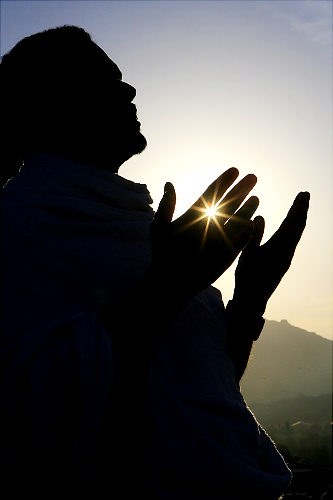
Dua to be recited on Laylatul Baraa-at
Hadhrat ‘Aaisha (RA) says: I heard Rasulullah b read the following dua in his sajdah on this night:
![]()
Dua
I seek protection in your forgiveness from your punishment; and I seek shelter in your pleasure from your displeasure; and I seek safety in you, from you. Glory be to you. I am unable to fully praise you. You are as you have praised yourself.
Thereafter he said to me: “Learn this dua and teach it to others. Jibra’eel (AS) taught this dua to me and asked me to recite it in my sajdah.” (Shu’abul Imaan #3556).
By: Maulana Ismail Bayat Darul Ihsan
June 21, 2012
June 12, 2012
 12th annual Youth Tarbiyah Conference – a free admissions event that strives to educate youth amidst the challenges we face in the 21st century, while encouraging them to be vibrant, productive North American citizens, and active, integral members of the mosque community who adopt leadership roles in mainstream society. Our goal is to provide our youth with the tools required to overcome the temptations of society, while remaining steadfast in faith and introducing positive change in the community.
12th annual Youth Tarbiyah Conference – a free admissions event that strives to educate youth amidst the challenges we face in the 21st century, while encouraging them to be vibrant, productive North American citizens, and active, integral members of the mosque community who adopt leadership roles in mainstream society. Our goal is to provide our youth with the tools required to overcome the temptations of society, while remaining steadfast in faith and introducing positive change in the community.
For more information please visit www.youthtarbiyah.com
June 7, 2012
Shaykh Yusuf Badat and Rabbi Tina Grimberg to address Jewish Muslim interfaith and religious teachings on organ donation:
FOR MORE INFORMATION PLEASE VISIT www.mathabah.org